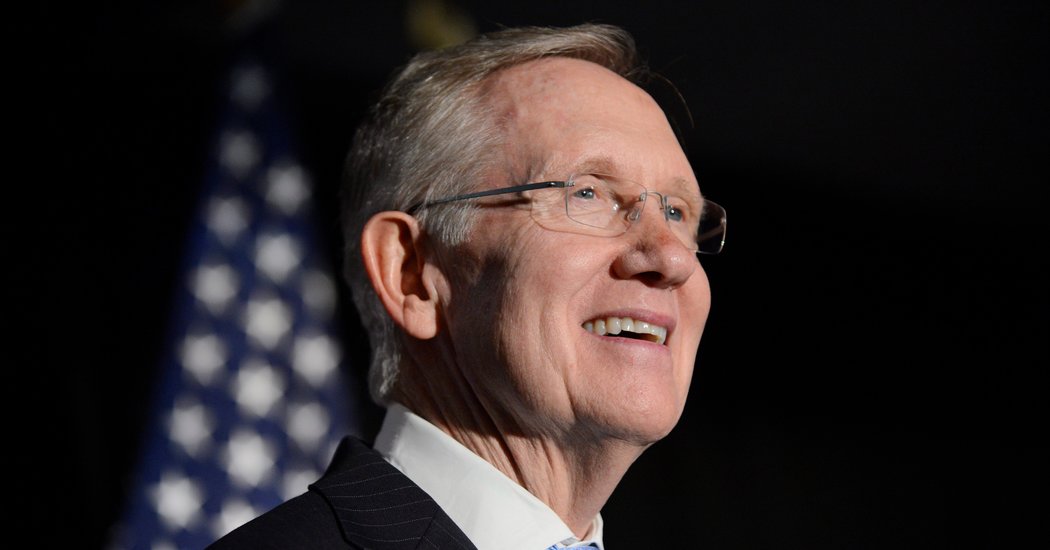Harry Reid had been treated for pancreatic cancer, which was diagnosed in 2018, but lived to see the Las Vegas airport renamed for him earlier this month.

Harry Reid, the Democrat who rose from childhood poverty in the rural Nevada desert to the heights of power in Washington, where he steered the Affordable Care Act to passage as Senate majority leader, died Tuesday in Henderson, Nevada. He was 82.
Reid had been treated for pancreatic cancer, which was diagnosed in 2018, but lived to see the Las Vegas airport renamed for him earlier this month. His death was confirmed in statements from Gov. Steve Sisolak of Nevada and Sen. Chuck Schumer, D-N.Y., the majority leader.
Even by the standards of the political profession, where against-the-odds biographies are common and modest roots an asset, what Reid overcame was extraordinary. He was raised in almost Dickensian circumstances in tiny Searchlight, Nevada: His home had no indoor plumbing, his father was an alcoholic miner who eventually committed suicide, and his mother helped the family survive by taking in laundry from local brothels.
After two decades of campaigns in Nevada marked by success, setback and recovery, Reid was elected to the Senate in 1986. He became the chamber’s Democratic leader after the 2004 election.
But it was not until his colleague Barack Obama was elected president four years later that Reid was able to meld his deep knowledge of congressional rules, his facility with horse-trading and his cussed determination to unify his 60-seat majority and pass landmark legislation.
Pushing through a sweeping economic stimulus after the Great Recession, a new set of rules governing Wall Street, and the most significant expansion of health care coverage since the Great Society of the 1960s — all with scant Republican support — Reid became, along with House Speaker Nancy Pelosi, one of the indispensable lawmakers of the Obama era.
“The records will be written about the eight years of Obama and Reid,” Reid boasted shortly after he announced in 2015 that he would not seek reelection the following year.
Yet the three-decade Senate tenure of this soft-spoken yet ferociously combative Nevadan, a middleweight boxer in his youth, also traced the chamber’s evolution from a collegial and consensus-oriented institution to the partisan and fractured body it has become. Republicans placed some of the blame on Reid for this change, pointing to his 2013 decision to upend Senate rules by doing away with the filibuster on most nominations by a president.
Reid, though, reflected the broader leftward shift of his party and his state. First elected to the House of Representatives in 1982, when Nevada finally grew large enough to require a second seat, he arrived in the capital as a moderate western Democrat: opposed to abortion rights, largely supportive of gun rights and uneasy about immigration.
But as Nevada grew from an overwhelmingly rural, white redoubt of ranches and mines to a polyglot gambling mecca in which 70% of voters live in the Las Vegas area, Reid adapted as a matter of necessity. He won his final reelection in 2010, a dismal year for Democrats nationally, thanks in part to an outpouring of support from his state’s rapidly growing Hispanic and Asian communities.
“I may have won without them, but I doubt it,” Reid said later.
But after Democrats lost the Senate majority in 2014, Reid decided not to run for a sixth term. He said he did not want to be one of those senators who served well into old age.
While he was willing to adjust with the times politically, he remained a stylistic throwback. A Mormon who neither drank nor smoked, he also shunned his state’s principal industry, claiming with his characteristic bluntness that “the only people who make money from gambling are the joints and government.”
Reid ran Nevada’s Democratic Party in the manner of an old-style political boss, arranging his own succession and even remaining in charge after his cancer diagnosis and through the 2018 midterm elections, nearly two years after his retirement. He also used his clout to elevate his state’s role in the presidential nominating process, and in 2016 he quietly helped Hillary Clinton salvage her nomination there.
Harry Mason Reid Jr. was born on Dec 2, 1939, in Searchlight, a mining outpost that had about 200 residents in his youth. One of four sons of Harry Sr. and Inez (Jaynes) Reid, he grew up in privation.
To attend high school, he would hitchhike 40 miles to Henderson, near Las Vegas, where he had relatives. And it was there that his political career effectively began. He had a teacher and boxing coach named Mike O’Callaghan, who would be elected governor in 1970 with Reid as his running mate.
With financial assistance from Nevada businessmen, Reid graduated from Utah State University, where he converted to Mormonism. He then attended law school at George Washington University in Washington, D.C., moonlighting as a Capitol Police officer to pay his way through.
With his law degree, he returned to Nevada and became the local prosecutor in Henderson. He was elected to the Nevada state Assembly in 1968. Two years later, he and O’Callaghan were elected statewide.
Then, unexpectedly, Sen. Alan Bible, a Democrat, announced in 1974 that he would not run for reelection. Reid won his party’s nomination but lost in the general election to Paul Laxalt, a popular former Republican governor, by fewer than 700 votes.
After an ill-fated bid for the Las Vegas mayoralty in 1975, Reid’s career was floundering. But O’Callaghan again came to his aid, making Reid chair of the Nevada Gaming Commission.
As gaming commissioner he was offered bribes and participated in FBI stings. Near the end of his tenure his wife, Landra Reid, came out of their house one day to find a bomb attached to the family’s station wagon.
Landra Reid, who was his closest adviser, survives him, as do his children, Rory, Lana Reid Barringer, Leif, Josh and Key, and 19 grandchildren.
Following the 1980 census, Nevada, for the first time in its history, had a large enough population to merit a second House seat, representing the Las Vegas area. Reid won the new district, but after two terms a Senate seat again opened up, thanks to Laxalt’s retirement.
Reid again benefited from running in a good Democratic year, in 1986, and he handily defeated Laxalt’s hand-picked successor, former Rep. Jim Santini. After another agonizingly close race in 1998 — he won by fewer than 500 votes following a recount — Reid was elected minority whip.
After Sen. Tom Daschle of South Dakota, the Democratic leader, was defeated in 2004, Reid effectively secured the commitments he needed to take over the caucus by the next day.
Democrats took back control of the Senate in 2006 and Reid became majority leader. He played a key role in passing the bank bailout after the stock market collapsed in the fall of 2008. Later that year, when Obama was elected, Democrats made even more gains, giving Reid a filibuster-proof majority.
Reid’s hard-nosed tactics handed Democrats a series of major achievements, but he was vulnerable to defeat entering what would be his final reelection campaign in 2010. His allies undermined a potentially strong candidate and helped lift a far-right conservative, Sharron Angle. He won the general election comfortably.

